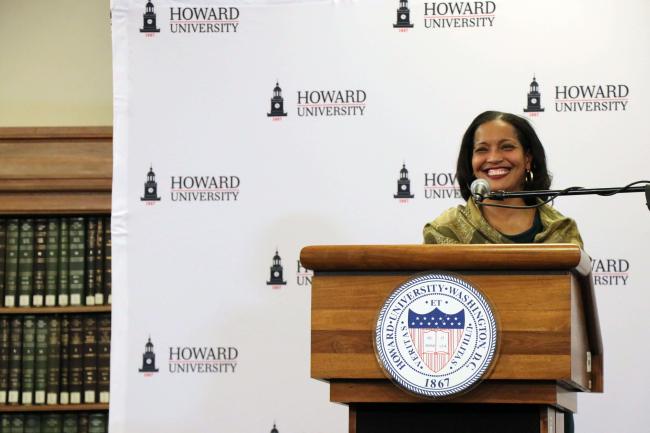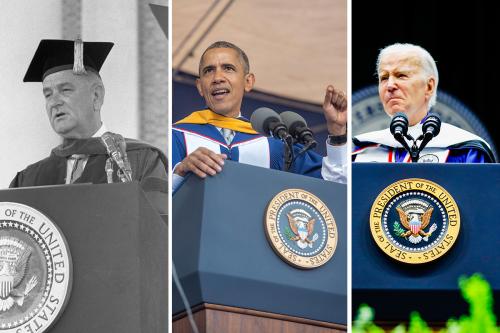WASHINGTON (March 19, 2019)—The Ronald W. Walters Leadership and Public Policy Center hosted the inaugural installment of the Edgar Kemler Lecture Series, featuring Congresswoman Jahana Hayes. Held earlier this month in Founders Library, Congresswoman Hayes reflected on her personal relationship education, her experience as an advocate and her journey to Congress.
“Your narrative fits right in with so many Howard students, who are often the first in their family to attend college, who work hard to expand the opportunities available to them,”said Howard University President Wayne A. I. Frederick to Congresswoman Hayes.“Regardless of what major Howard students have, they are here on a mission. And that mission goes well beyond themselves…it goes towards a commitment to give opportunities to others who otherwise wouldn’t have it. So, your story is certainly an aspiration to so many on the path that you have already traveled.”
Congresswoman Hayes is the first African-American woman to ever represent the state of Connecticut in Congress. She was elected to represent the Fifth District of Connecticut in November 2018.
“I look out at you and see a younger me. And I hope that when you look at me, you see an older you. Because while I am the first African-American woman from the state of Connecticut to represent the state in Congress, I have to tell you, that there is a tremendous amount of shame and pride in that statement,”said Congresswoman Hayes.
Congresswoman Hayes graduated from Naugatuck Valley Community College, Southern Connecticut State University and the University of Bridgeport. She has earned a bachelor’s degree in history and secondary education, a master’s degree in curriculum and instruction and a degree in administrative leadership. Due to her personal and professional experience with education, she is a passionate advocate for providing equitable access to education and opportunity for all students. In addition, the Congresswoman’s legislative priorities emphasize gun violence prevention in all communities, ensuring access to health care for as many Americans as possible, and working in a bi-partisan way to bring positive change to the lives of all people.
“I am a teacher. I am still a teacher. I am advocating from a different perspective, but my work has not changed. My classroom has just changed…I came to Congress for some very simple ideas, and it was really about access to equity and opportunity,”said Congresswoman Hayes.
After Congresswoman Hayes’candid speech, Howard students and community members were given the opportunity to question and speak with her. From questions focused on the funding of private and charter schools to trauma training for educators, Congresswoman Hayes gave thorough answers to each question and comment from the Howard community.
“Call me naive, call me a little crazy, but…If people who are well-intentioned and care about their communities and care about other people just do their part, and not try to take on the whole public, but just do their part. And do that in collaboration with the person next to them doing their part,there is a greater [chance] of restoring hope and faith in our communities and really setting the table for the next generation to inherit something better. I don't know, call me crazy, but I guess it takes the right amount of crazy to do anything successful,”said Congresswoman Hayes.
###
About Howard University
Founded in 1867, Howard University is a private, research university that is comprised of 13 schools and colleges. Students pursue studies in more than 120 areas leading to undergraduate, graduate and professional degrees. The University operates with a commitment to Excellence in Truth and Service and has produced four Rhodes Scholars, 11 Truman Scholars, two Marshall Scholars, one Schwarzman Scholar, over 70 Fulbright Scholars and 22 Pickering Fellows. Howard also produces more on-campus African-American Ph.D. recipients than any other university in the United States. For more information on Howard University, visit www.howard.edu.





